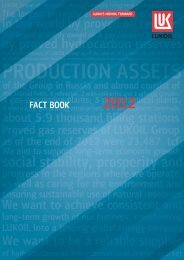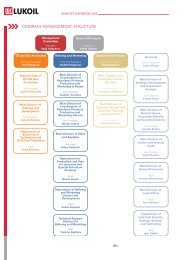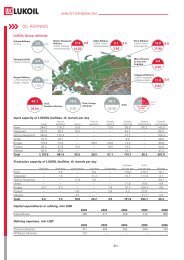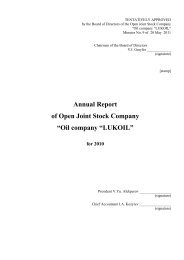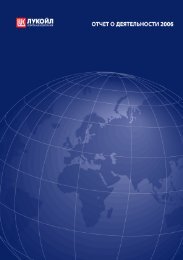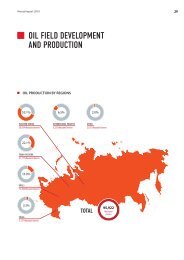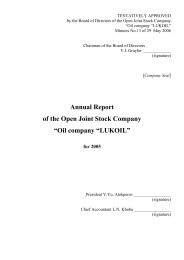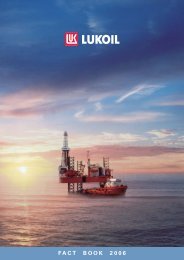ANNUAL REPORT 2005 - Lukoil
ANNUAL REPORT 2005 - Lukoil
ANNUAL REPORT 2005 - Lukoil
You also want an ePaper? Increase the reach of your titles
YUMPU automatically turns print PDFs into web optimized ePapers that Google loves.
FINANCIAL ACCOUNTS<br />
Environmental liabilities<br />
Group companies and their predecessor entities have operated in the Russian Federation and other countries for many<br />
years and, within certain parts of the operations, environmental related problems have developed. Environmental regulations<br />
are currently under consideration in the Russian Federation and other areas where the Group has operations. Group<br />
companies routinely assess and evaluate their obligations in response to new and changing legislation.<br />
As liabilities in respect of the Group's environmental obligations are able to be determined, they are charged against<br />
income over the estimated remaining lives of the related assets or recognized immediately depending on their nature.<br />
The likelihood and amount of liabilities relating to environmental obligations under proposed or any future legislation<br />
cannot be reasonably estimated at present and could become material. Under existing legislation, however, management<br />
believes that there are no significant unrecorded liabilities or contingencies, which could have a materially adverse effect<br />
on the operating results or financial position of the Group.<br />
Social assets<br />
Certain Group companies contribute to Government sponsored programs, the maintenance of local infrastructure and the<br />
welfare of their employees within the Russian Federation and elsewhere. Such contributions include assistance with the<br />
construction, development and maintenance of housing, hospitals and transport services, recreation and other social<br />
needs. The funding of such assistance is periodically determined by management and is appropriately capitalized or<br />
expensed as incurred.<br />
Taxation environment<br />
The taxation systems in the Russian Federation and other emerging markets where Group companies operate are relatively<br />
new and are characterized by numerous taxes and frequently changing legislation, which is often unclear, contradictory,<br />
and subject to interpretation. Often, differing interpretations exist among different tax authorities within the same<br />
jurisdictions and among taxing authorities in different jurisdictions. Taxes are subject to review and investigation by a<br />
number of authorities, which are enabled by law to impose severe fines, penalties and interest charges. In the Russian<br />
Federation a tax year remains open for review by the tax authorities during the three subsequent calendar years; however,<br />
under certain circumstances a tax year may remain open longer. Recent events within the Russian Federation suggest<br />
that the tax authorities are taking a more assertive position in their interpretation and enforcement of tax legislation. Such<br />
factors may create taxation risks in the Russian Federation and other emerging markets where Group companies<br />
operate substantially more significant than those in other countries where taxation regimes have been subject to development<br />
and clarification over long periods.<br />
The regional organizational structure of the Russian Federation tax authorities and the regional judicial system can mean<br />
that taxation issues successfully defended in one region may be unsuccessful in another region. The tax authorities in<br />
each region may have a different interpretation of similar taxation issues. There is however some degree of direction provided<br />
from the central authority based in Moscow on particular taxation issues.<br />
The Group has implemented tax planning and management strategies based on existing legislation at the time of implementation.<br />
The Group is subject to tax authority audits on an ongoing basis, as is normal in the Russian environment and<br />
other republics of the former Soviet Union, and, at times, the authorities have attempted to impose additional significant<br />
taxes on the Group. Management believes that it has adequately met and provided for tax liabilities based on its interpretation<br />
of existing tax legislation. However, the relevant tax authorities may have differing interpretations and the effects on<br />
the financial statements, if the authorities were successful in enforcing their interpretations, could be significant.<br />
"Income tax expense" and "Taxes other than income taxes" in the consolidated statement of income include $163 million<br />
in relation to the results of tax audits of the Group companies for periods prior to the 2004 financial year.<br />
Litigation and claims<br />
On November 27, 2001, Archangel Diamond Corporation ("ADC"), a Canadian diamond development company, filed a<br />
lawsuit in the District Court of Denver, Colorado, against OAO "Arkhangelskgeoldobycha" ("AGD"), a Group company, and<br />
the Company (together the "Defendants"). ADC claims, among other things, that the Defendants interfered with the<br />
transfer of a diamond exploration license to Almazny Bereg, a joint venture between ADC and AGD. The total damages<br />
claimed by ADC are approximately $4.8 billion, including compensatory damages of $1.2 billion and punitive damages<br />
of $3.6 billion. On October 15, 2002, the District Court of Denver, Colorado dismissed ADC's action against the<br />
Defendants based on lack of personal jurisdiction. On November 22, 2002, the Denver District Court denied ADC's<br />
request for reconsideration of the Court's October 15th order dismissing the case. ADC subsequently filed an appeal<br />
on November 27, 2002 with the Court of Appeals in the State of Colorado. On March 25, 2004, the Court of Appeals<br />
upheld the October 15, 2002 decision of the District Court. On April 17, 2004, ADC filed a motion for rehearing that was<br />
denied on June 17, 2004. ADC then filed a petition for writ of certiorari with the Colorado Supreme Court on July 16,<br />
2004. On January 10, <strong>2005</strong>, the Colorado Supreme Court granted certiorari on a narrow issue: whether the Court of<br />
Appeals erred by concluding that a trial court may decide a motion to dismiss for lack of personal jurisdiction by weighing<br />
and resolving factual issues without an evidentiary hearing. The Colorado Supreme Court declined to review ADC's<br />
160



